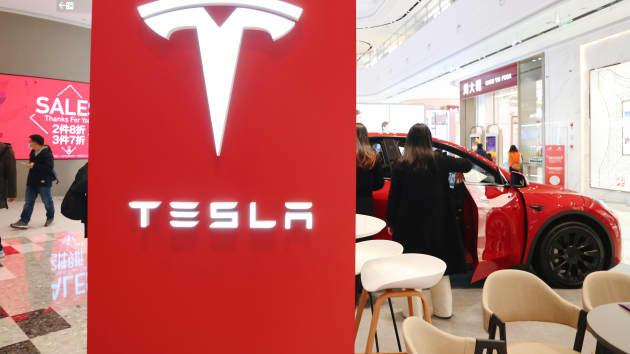
Tesla left its devoted following of retail investors in the lurch over plans for an upcoming stock split after missing a key regulatory deadline.
In late March, the company said its board would seek shareholder approval for its second split in two years, but stopped short of providing the concrete ratio. Instead it promised additional details would be provided as part of its “definitive proxy statement”, essentially the agenda for an upcoming annual meeting.
The SEC’s required time limit for filing, however, expired over the weekend, forcing Tesla to warn it would need an extension.
“We currently expect that our definitive proxy statement for the 2022 annual meeting of stockholders will be filed later than the 120th day after the end of the last fiscal year,” it said in an updated regulatory filing made public on Monday.
Coming so soon on the heels of Elon Musk’s $44 billion Twitter bid, the delay reignites an ongoing debate as to whether Musk may be overextending himself.
Apart from retweeting Tesla’s official announcement that the AGM will take place on Aug. 4, the workaholic CEO has focused his recent social media postings on the broader political fallout of his high profile takeover.
A Reuters report from Monday citing informed sources suggests Musk is currently in negotiations with large investment firms and high net-worth individuals about taking on more financing for his Twitter deal in order to tie up less of his personal wealth. Last week he sold roughly 9.64 million shares, worth around $8.5 billion to help fund his plans for the social media platform.
No direct effect
Details on the stock split—which does nothing but optically lower the price of each share—is key for many, because Tesla is beloved chiefly among retail investors.
Vanda Research named it as one of the top ten favorites of small shareholders alongside names like Apple, Chinese EV maker NIO, data miner Palantir and meme stock AMC Entertainment.
By comparison, portfolio managers generally pay little heed to stock splits as they have no direct effect on either a company’s underlying fundamentals or its valuation.
According to data from Nasdaq, institutionals own only about 42% of Tesla versus, for example, 78% for Meta, another mega-cap tech stock with a dominant shareholder as its CEO.
A lot of that has to do with Tesla’s stratospheric price-to-earnings multiples that has attracted big name short sellers like Kynikos Associates’ Jim Chanos, Greenlight Capital’s David Einhorn and Michael Burry of The Big Short fame.
At its current price of $902.94, Tesla trades at a very aggressive 73 times consensus 2022 estimates. It is set to open Tuesday roughly flat, in line with minor gains in Nasdaq futures.
The stock split would be the EV pioneer’s second. In August 2020, the company issued four new shares for each existing one investors owned.
Fortune.com




Hello my loved one! I want to say that this article is awesome, great written and come with almost all vital infos. I would like to see more posts like this .
Wonderful website you have here but I was curious if you knew of any community forums that cover the same topics discussed in this article? I’d really love to be a part of group where I can get feedback from other knowledgeable individuals that share the same interest. If you have any suggestions, please let me know. Cheers!
Good blog! I truly love how it is simple on my eyes and the data are well written. I’m wondering how I might be notified when a new post has been made. I have subscribed to your feed which must do the trick! Have a nice day!
Hey there I am so happy I found your blog page, I really found you by error, while I was browsing on Google for something else, Nonetheless I am here now and would just like to say kudos for a tremendous post and a all round interesting blog (I also love the theme/design), I don’t have time to go through it all at the minute but I have book-marked it and also added your RSS feeds, so when I have time I will be back to read more, Please do keep up the superb work.
You could certainly see your skills in the paintings you write. The arena hopes for even more passionate writers like you who are not afraid to say how they believe. All the time follow your heart. “A simple fact that is hard to learn is that the time to save money is when you have some.” by Joe Moore.
of course like your web site but you have to take a look at the spelling on quite a few of your posts. A number of them are rife with spelling issues and I to find it very bothersome to inform the truth however I¦ll definitely come again again.
I like what you guys are up too. Such smart work and reporting! Keep up the superb works guys I have incorporated you guys to my blogroll. I think it’ll improve the value of my website 🙂
I do enjoy the way you have presented this particular issue and it does offer us a lot of fodder for thought. However, coming from what I have personally seen, I really trust when other feed-back pack on that people today stay on issue and don’t get started on a tirade associated with the news du jour. Yet, thank you for this superb point and whilst I do not really agree with the idea in totality, I respect your viewpoint.
Great post, you have pointed out some great details , I too conceive this s a very superb website.
I got what you mean , appreciate it for posting.Woh I am lucky to find this website through google. “Since the Exodus, freedom has always spoken with a Hebrew accent.” by Heinrich Heine.
Whats Taking place i’m new to this, I stumbled upon this I have found It positively useful and it has helped me out loads. I’m hoping to give a contribution & help different customers like its aided me. Good job.
Some times its a pain in the ass to read what website owners wrote but this website is very user pleasant! .
Does your website have a contact page? I’m having trouble locating it but, I’d like to send you an email. I’ve got some creative ideas for your blog you might be interested in hearing. Either way, great website and I look forward to seeing it grow over time.
Heya i am for the first time here. I found this board and I find It really useful & it helped me out much. I hope to give something back and help others like you helped me.
My brother suggested I might like this web site. He was totally right. This post truly made my day. You cann’t imagine just how much time I had spent for this information! Thanks!
Excellent site. Plenty of useful info here. I am sending it to several friends ans also sharing in delicious. And naturally, thanks for your effort!
I have recently started a site, the info you offer on this site has helped me tremendously. Thank you for all of your time & work.
I’m curious to find out what blog system you have been utilizing? I’m having some small security problems with my latest website and I would like to find something more secure. Do you have any suggestions?
naturally like your website but you have to check the spelling on quite a few of your posts. Several of them are rife with spelling issues and I find it very bothersome to tell the truth nevertheless I’ll certainly come back again.
Write more, thats all I have to say. Literally, it seems as though you relied on the video to make your point. You clearly know what youre talking about, why throw away your intelligence on just posting videos to your blog when you could be giving us something informative to read?
I just could not depart your web site before suggesting that I extremely enjoyed the standard info a person provide for your visitors? Is gonna be back often in order to check up on new posts
Heya are using WordPress for your site platform? I’m new to the blog world but I’m trying to get started and create my own. Do you need any coding knowledge to make your own blog? Any help would be greatly appreciated!
Wonderful blog! I found it while browsing on Yahoo News. Do you have any tips on how to get listed in Yahoo News? I’ve been trying for a while but I never seem to get there! Thank you
Its fantastic as your other blog posts : D, thankyou for putting up. “As experience widens, one begins to see how much upon a level all human things are.” by Joseph Farrell.
Awesome site you have here but I was wondering if you knew of any community forums that cover the same topics discussed in this article? I’d really love to be a part of online community where I can get suggestions from other knowledgeable individuals that share the same interest. If you have any recommendations, please let me know. Thanks!
Very interesting points you have observed, thankyou for posting.
I’d need to test with you here. Which isn’t something I normally do! I enjoy reading a publish that will make individuals think. Additionally, thanks for permitting me to remark!
I have learn several excellent stuff here. Definitely worth bookmarking for revisiting. I surprise how much effort you set to make one of these wonderful informative web site.
But wanna comment on few general things, The website layout is perfect, the subject matter is real wonderful. “I delight in men over seventy. They always offer one the devotion of a lifetime.” by Oscar Fingall O’Flahertie Wills Wilde.
There’s noticeably a bundle to know about this. I assume you made certain good factors in options also.
Very great information can be found on site. “I can think of nothing less pleasurable than a life devoted to pleasure.” by John D. Rockefeller.